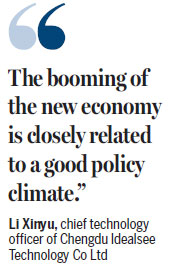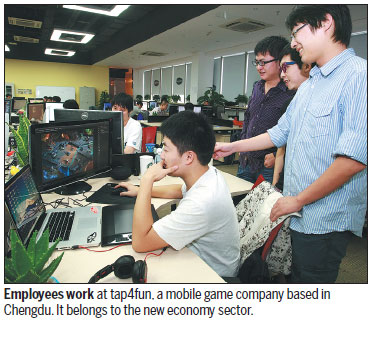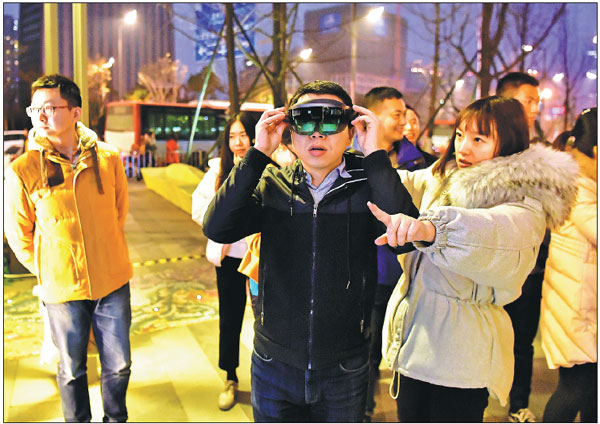Chengdu releases policy to help new economy drivers take flight
City announces 10 billion yuan fund to boost creation of vital, high-tech modern industries
Chengdu, capital of Southwest China's Sichuan province, plans to construct a new economy industrial system that can compete on the global stage and promote regional development.
According to an official document released by the local government earlier this month, Chengdu will focus on developing the digital, intelligent, green, innovative, data-focused and shared economies - together, the new economy. The document, which also lists representative industries in each category, is the first of its kind in China.
Zhang Xinyu, director of Chengdu's new economy committee, said the document defines the new economy from Chengdu's perspective.
The city's goal is clear: By 2020, its new economy is expected to stand at the national forefront. It will have more than 100,000 new-economy-related companies, seven unicorn companies and over 60 potential unicorn companies.
Within that timeframe, Chengdu will become a pioneer and an ideal city for the promotion of the new economy, which can explore many application possibilities, attract assets and professionals, and innovate its business environment, according to the plans.

The document lists seven demonstration projects related to the new economy: improving the city's capacity to serve the real economy, building an intelligent city, improving the efficiency of innovation and entrepreneurship platforms, matching human resources with assets, upgrading the consumption model, constructing a green and low-carbon environment and innovating the modern supply chain.
These development focuses will provide more opportunities for new economy-related companies in the city, thus promoting the development of new technologies, industries and business models, Zhang said.
Since new economy-related companies are often asset-light with both high growth potential and risk, the local government plans to welcome more venture capital and strengthen resources integration.
The document stipulates that the government will provide newly established or relocated domestic and overseas financial institutions allowances of up to 40 million yuan ($6.1 million), to enlarge the local financial scale.
The local government will also set aside initial funding of up to 200 million yuan and a development fund up to 10 billion yuan, to finance startups during their development process.
Credit rating agencies are encouraged to provide credit ratings for new economy-related companies with allowance from the government, as part of efforts to improve their ability to attract investment.
Commercialization of scientific achievements will be stressed by boosting cooperation with local colleges and innovative enterprises with special funds, Zhang added.
Huo Weidong, president of Beijing Geely University, said enterprises and investors would have more faith in the city because of these policies and services.
"I believe Chengdu will become a promising land for investors."
Li Xinyu, chief technology officer of Chengdu Idealsee Technology Co Ltd, said that some previous policies no longer meet the needs of new economy companies, whose growth path is different from traditional ones. The new policies give specific solutions to cultivate those companies at different stages of their development, Li said.
"We met many difficulties in the early stages and the government provided significant help and support," Li said. "The booming of the new economy is closely related to a good policy climate."
According to the document, the number of innovation service institutes is expected to surpass 400 by 2022. Investment in research and development across the city is forecast to reach 4.3 percent of its GDP.
The annual growth rate of medium and small-sized technology companies is expected to exceed 20 percent and the number of people involved in tech startups will surpass 280,000, it predicts.
The city will establish more than 100 new funds for startups and the scale of private equity investment will surpass 210 billion yuan, according to the document.


|
Young people try on virtual reality glasses produced by a Chengdu-based new economy enterprise.Photos provided to China Daily |
(China Daily 12/29/2017 page19)















